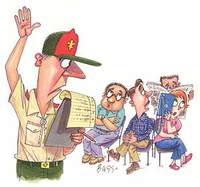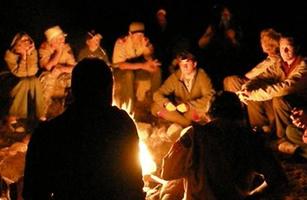 When I first volunteered with the troop committee, there was a lot of interaction between the Scouts and adults on campouts. At one low point in our membership (a trend that was not surprising in retrospect), we had nearly as many adults as Scouts going camping. Why not? – the adults enjoyed camping as much as the boys did. However, the adults didn’t exactly leave the boys alone. In fact, on many campouts the boys asked the adults to do the cooking (and the adults agreed – especially the Scoutmaster). I’ll say we had some delicious meals, but that’s not the point, at least for the Scouts. We’d get to camp and the adults would be barking orders at the Scouts to get the dining flies and tents set up over there, and would jump in and do it for them if they were having trouble. Hikes were nearly always led by the Scoutmaster or an assistant (as in the movie Follow Me Boys or any of a dozen other stereotypes). Adults often fiddled with the menus the boys drew up (even making the menu occasionally themselves), taught Scout skills, built fires, and got on the boys to clean up. It’s no wonder I was conflicted about the way I saw things unfolding versus the way I had heard it was supposed to be. I didn’t know it at the time, but it was a classic sign of untrained adult leadership. Continue reading “The role of “other” adults, part 2″
When I first volunteered with the troop committee, there was a lot of interaction between the Scouts and adults on campouts. At one low point in our membership (a trend that was not surprising in retrospect), we had nearly as many adults as Scouts going camping. Why not? – the adults enjoyed camping as much as the boys did. However, the adults didn’t exactly leave the boys alone. In fact, on many campouts the boys asked the adults to do the cooking (and the adults agreed – especially the Scoutmaster). I’ll say we had some delicious meals, but that’s not the point, at least for the Scouts. We’d get to camp and the adults would be barking orders at the Scouts to get the dining flies and tents set up over there, and would jump in and do it for them if they were having trouble. Hikes were nearly always led by the Scoutmaster or an assistant (as in the movie Follow Me Boys or any of a dozen other stereotypes). Adults often fiddled with the menus the boys drew up (even making the menu occasionally themselves), taught Scout skills, built fires, and got on the boys to clean up. It’s no wonder I was conflicted about the way I saw things unfolding versus the way I had heard it was supposed to be. I didn’t know it at the time, but it was a classic sign of untrained adult leadership. Continue reading “The role of “other” adults, part 2″
The role of “other” adults, part 1
 Nearly all of us grew up with our sons in Scouting, starting first with Cub Scouts. We remember the pleas for help from the Cub parents. You were always in need of a parent to head up the next outing or field trip or make a run to the Scout shop or work at the popcorn sale table at the supermarket this weekend. Cub Scouts doesn’t run without heavy parent involvement, so we get somewhat accustomed to feeling the need for lots of parental help and missing it when it isn’t there.
Nearly all of us grew up with our sons in Scouting, starting first with Cub Scouts. We remember the pleas for help from the Cub parents. You were always in need of a parent to head up the next outing or field trip or make a run to the Scout shop or work at the popcorn sale table at the supermarket this weekend. Cub Scouts doesn’t run without heavy parent involvement, so we get somewhat accustomed to feeling the need for lots of parental help and missing it when it isn’t there.
So naturally, when our sons cross over to a troop, those of us who are committed to the program step forward and volunteer for an adult role. Continue reading “The role of “other” adults, part 1″
Let boys be boys!
 For  most kids, play dates can be fun. You get dropped off at a friend’s house, play a few games, maybe have lunch or a snack that Mom prepared, the go play in the backyard, watch TV or play video games, then get picked up and go back home. Sounds like fun, right? But for a lot of people, what they fondly remember were long days spent playing with friends in an unstructured manner. You’d go to the park and swing on the big swingset, roam the neighborhood, ride bikes all over town, sneak into the kitchen and cook some hot dogs for lunch, then just hang out and build a fort in the backyard with things you’d find in the garage. Continue reading “Let boys be boys!”
For  most kids, play dates can be fun. You get dropped off at a friend’s house, play a few games, maybe have lunch or a snack that Mom prepared, the go play in the backyard, watch TV or play video games, then get picked up and go back home. Sounds like fun, right? But for a lot of people, what they fondly remember were long days spent playing with friends in an unstructured manner. You’d go to the park and swing on the big swingset, roam the neighborhood, ride bikes all over town, sneak into the kitchen and cook some hot dogs for lunch, then just hang out and build a fort in the backyard with things you’d find in the garage. Continue reading “Let boys be boys!”
How to be a better Scouter
 It goes without saying that every Scouter is in on the mission of Scouting to provide and support an excellent program for our boys. We’re looking for ways to better relate to the Scouts and our fellow Scouters. In what’s known as the 80/20 rule, in general 80 percent of the results comes from 20 percent of the effort in just about any undertaking.
It goes without saying that every Scouter is in on the mission of Scouting to provide and support an excellent program for our boys. We’re looking for ways to better relate to the Scouts and our fellow Scouters. In what’s known as the 80/20 rule, in general 80 percent of the results comes from 20 percent of the effort in just about any undertaking.
In a recent Fast Company blog post Six Painless Ways to Become a Better Boss, developer and CEOÂ Brendon Schenecker explains several relatively simple steps one can take to improve their relationship with the people they oversee and support. Continue reading “How to be a better Scouter”
We have to get it right!
 What if the coach of a basketball team let eight or nine players play at a time? Or let them shoot into both baskets? Have you ever seen a baseball game where the batter could swing at as many pitches as he wanted to until he got a hit, or keep running the bases after she was tagged out? Would a band director let the trombones play the flutes’ score if they liked that music better?
What if the coach of a basketball team let eight or nine players play at a time? Or let them shoot into both baskets? Have you ever seen a baseball game where the batter could swing at as many pitches as he wanted to until he got a hit, or keep running the bases after she was tagged out? Would a band director let the trombones play the flutes’ score if they liked that music better?
These are all absurd situations. The rules of various sports are clearly defined, and the game has to be played by those rules. A band or orchestra has to play the score pretty much as it was written, or cacophony would result.
So why do some Scouters fail to understand how a troop works, or disobey the rules because they think they know better? Continue reading “We have to get it right!”

